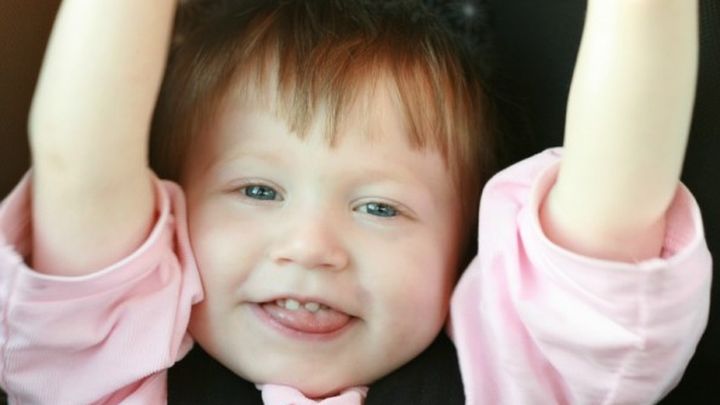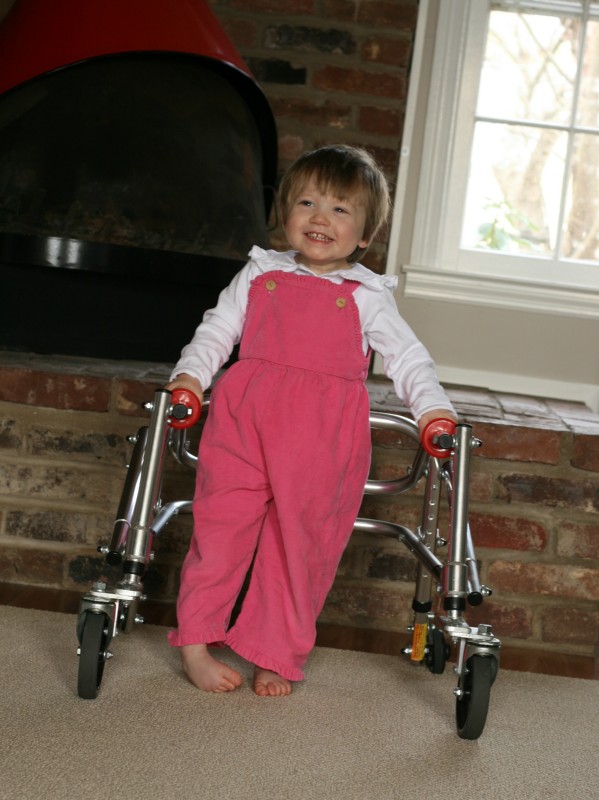
Hope for Katherine Belle

Katherine Belle was born healthy on July 9, 2011, and she developed normally (as far as we could see) for the first year of her life. But when she wasn’t walking at 18 months, she began physical therapy to help her learn to walk. Around this time, Katherine also exhibited signs of Sensory Processing Disorder (SPD). This meant that everyday activities such as taking a bath, playing with sand, or sitting on a grassy lawn were overwhelming for Katherine, so she began occupational therapy as well.
(Thanks to her wonderful occupational therapist, Julie Kraska, Katherine has made tremendous progress in this area.)
When she turned two in July of 2013 and was still unable to walk, Katherine’s pediatrician referred her to be evaluated by neurologists at Cincinnati Children’s Hospital. After observing Katherine and noting a lack of balance and coordination (ataxia), low muscle tone (hypotonia), mild intention tremors (for example, her hands tremble slightly if she reaches for a toy), and gross motor regression (meaning she was standing on her own less frequently), the pediatric neurologists ordered an MRI and an MRS of Katherine’s brain.
The MRI showed a malformation of her cerebellum, the area of the brain that controls balance and regulates movement. This explained why Katherine was (and still is) severely off-balance and unable to walk without assistance. The MRS showed abnormal brain chemistry. Together, the results of these two tests indicated a likely metabolic disorder. The doctors in Cincinnati concluded Katherine likely had an incredibly rare genetic disease called Infantile Neuroaxonal Dystrophy (INAD). INAD is an inherited neurological disorder that affects axons, which carry messages from the brain to other parts of the body. It is known to cause progressive loss of vision, loss of motor control (including loss of previously acquired skills such as crawling and sitting), and deterioration in speech. There is no known cure for INAD and no known treatment that can stop the progression of the disease. Life expectancy for children with INAD is between 5-10 years of age.
We were sick with devastation.
Katherine then underwent genetic testing to confirm the INAD diagnosis. We were relieved when the test came back negative, indicating that Katherine did NOT have INAD. However, we were cautioned that it is possible in a small percentage of cases to receive a negative test result but still to have INAD. Following the genetic testing, we transferred Katherine’s care to The Cleveland Clinic, and over several months she underwent various tests as we attempted to further rule out the INAD diagnosis. Two skin biopsies, a spinal tap, an eye exam, and an EEG (which detects abnormalities in brain wave patterns) all came back normal. However, a second MRI performed in June 2014 – a few weeks before Katherine’s third birthday – showed the disease is progressing in her brain and has now taken over her brain’s entire balance center. Despite all the other normal test results, Katherine’s doctors at The Cleveland Clinic felt that her MRI was so consistent with INAD that they did not know what else it could be.
Receiving all those normal test results had built up our hope that she did not have INAD, so to be told “INAD” again was more devastating than we can find the words to express. In July 2014 we sent all of Katherine’s test results and medical documentation to Dr. Susan Hayflick in Oregon. Dr. Hayflick specializes in and researches only INAD. We decided to consult with Dr. Hayflick for a third opinion before allowing our hearts and minds to accept this death sentence of a diagnosis.To our surprise, Dr. Hayflick’s opinion is that it is unlikely Katherine has INAD. According to her, INAD patients do not normally show progression in an MRI the way Katherine does. Although many of Katherine’s symptoms are very similar to those occurring in INAD patients, ALL of the testing we have done so far – including, apparently, the MRI – have given results inconsistent with INAD.
Through the generous donations we received from this GoFundme page, we were able to quickly proceed with Whole Exome Sequencing. In February 2015, whole exome sequencing results through GeneDx revealed that Katherine Belle has a rare form of Mitochondrial Complex 1 Deficiency based on mutations to her NUBPL gene. (We have been told that there are between 20-50 confirmed patients – ALL diagnosed through whole exome sequencing, and we believe this number will continue to grow with increased testing). To date we have found another family in California with two daughters with the same disorder.
The relief of knowing Katherine’s disorder cannot be overemphasized. No one should be in the dark about what is affecting them or their child, yet half of rare disease patients are in this very position. It must change. Rare diseases affect more people than all cancers plus HIV combined, yet half of the patients do not know what is wrong. Increased exome sequencing and research will help us unravel our genetic code and provide answers and treatments for the good of all. This is the future of medicine. Our prayers go out to the entire undiagnosed community.
At this time we are trying to fund research for NUBPL. Because there are only three known patients in the United States, private funding must be raised for this research. Please help us reach our goal so we can find a cure for KB, Cali, and Ryaan. For more information, please visit www.nubpl.org.
Other relevant artciles:
KB in the New York Times http://parenting.blogs.nytimes.com/2014/10/28/when-the-diagnosis-is-rare-parents-may-know-more-than-professionals/?_r=0
Meet Dr. Virgina Kimonis
http://www.pediatrics.uci.edu/features/feature-kimonis-082114.asp
Meet the Spooner Family
http://globalgenes.org/raredaily/the-life-we-live-the-spooner-family-story-a-documentary-by-ambry-genetics/